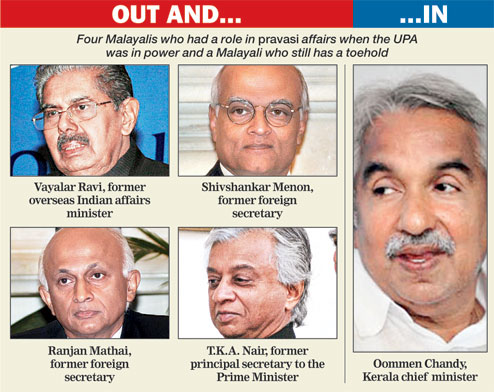
New Delhi, Jan. 6: The Nairs and the Menons and the Mathais have exited the seats of power and influence in Delhi with the arrival of Gujaratis, but the Pravasi Bharatiya Divas, although taking place in Gujarat's capital this week, continues to be the stronghold of Malayalis.
From the Gulf, Malayali expatriates have arrived in Gandhinagar in large numbers for the annual gathering of overseas Indians and flying the tricolour for them are Indian ambassadors from every single Gulf state.
Undaunted by the change of stewardship of the ministry of overseas Indian affairs which was headed by Vayalar Ravi, a Malayali, for most of the UPA government's decade-long tenure, Gulf Malayalis are determined to retain their hold over this ministry now under the charge of a Haryanvi, Sushma Swaraj.
Coincidentally, her minister of state, V.K. Singh, is also a Haryanvi. But the Malayalis know that Haryana does not count in the politics of people of Indian origin abroad, unlike Punjab or Gujarat.
Indian ambassadors in the Gulf have to preserve an umbilical cord with Malayalis in the countries where they are posted. In every Gulf state, they outnumber the local citizens and are the biggest single numerical expatriate group. Envoys who have severed this umbilical cord have come to grief in the past.
It is clear from the programme of this year's Pravasi Bharatiya Divas on the eve of its inauguration that these ambassadors have gone along with the wishes of their Kerala 'clients' in the jurisdiction of their missions to fight and keep overseas Indian affairs of the government in their grip.
All the Indian ambassadors in the Gulf have managed to get speaking slots at the three-day event in Gandhinagar. Malayalis attending the event are in no doubt that the envoys will use the occasion to reflect on their concerns and their vision of pravasi, the atmospherics of which have tilted the Gujarati way since the BJP came to power at the Centre.
In fact, envoys from the Gulf alone have got speaking slots in Gandhinagar. Not high commissioners from the UK, Canada, Singapore or Australia, which also have large populations who are of Indian origin. Not all these envoys posted in the Gulf are Malayalis: actually only one of them is from Kerala, although all of them speak predominantly for people from that state, given the demography of the oil rich region.
Lending a strong hand to this struggle for the preservation of Malayali stranglehold on matters affecting Indians abroad, is Kerala's chief minister, Oommen Chandy. Unlike most Congress chief ministers and other non-BJP state leaders like Bengal's Mamata Banerjee, Chandy shed his reservations about attending the Pravasi Bharatiya Divas in Narendra Modi's Gujarat.
Like the Indian ambassadors from the Gulf countries, Chandy, too, is a speaker at the event starting tomorrow. He has brought along with him some of his ministers and a large number of senior state officials to be of service to Malayalis who are in Gandhinagar. A bit like Narendra Modi's visit to Uttarakhand as Gujarat chief minister during the floods there to aid Gujaratis, although there is no calamity of any kind in Gandhinagar.
A critical indicator of which way things are headed for Malayali expatriates under Modi's dispensation will be available when this year's recipients of the Pravasi Bharatiya Samman are announced, usually on the last day of the three-day annual conclave.
During the long years when Vayalar Ravi was the minister for overseas Indian affairs, Malayalis from the UAE to the US figured prominently among the awardees. The Samman is given to up to 15 non-resident Indians in recognition of services by Indians abroad for the diaspora, for a better understanding of India abroad or for contributions to their motherland.
Ravi was never the one to choose the awardees by himself. The selection is made by a panel under the chairmanship of the vice-president. The panel includes the minister for overseas Indian affairs, the principal secretary to the Prime Minister, the home secretary and the foreign secretary, among others.
Call it a quirk of fate, the principal secretary to the Prime Minister for the better part of Manmohan Singh's tenure was T.K.A. Nair, a Malayali. The foreign secretary was Shivshankar Menon and later Ranjan Mathai, both Malayalis. The minister was Ravi from Kerala.
They are all gone and the ethnic disposition of the panel is singularly different this year. All eyes at the Mahatma Mandir in Gandhinagar, venue of the Pravasi Bharatiya Divas this week, are on whether that will change the ethnic composition of the recipients as well.
The ministry for overseas Indian affairs has had its crop of secretaries from the Kerala cadre of the IAS as well. No more. But the most critical post in organising the three conclave is still in the hands of a Malayali. T.K. Manoj Kumar, an IAS officer from Kerala, is the joint secretary of the diaspora services division of the ministry. Critics may attribute that to the tilt in Gandhinagar towards Gulf Indians.
Ever since the ministry for overseas Indian affairs was created, there has been a struggle among various Indian sub-nationalities for its control. When Jagdish Tytler was briefly the minister for overseas Indian affairs, Punjabis in the UK and Canada tried to influence its affairs.
When Tytler was replaced by Ravi, Malayalis got their chance. They are reluctant to let go of it to Gujaratis.











